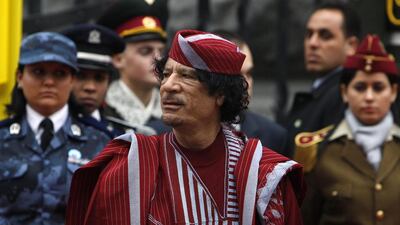One of Libya’s popular comedians, Said Al Jazoui, disappeared on July 24, only to reappear five days later.
He had been kidnapped, although no political or ransom demands were made before his release. Indeed, neither he nor his kidnappers shed any light on why he had been taken.
Al Jazoui started his acting career as a theatrical performer before he became a well-known face on TV. His case received a good deal of publicity, with his family calling on local rights organisations and politicians to help, while a good number of journalists and artists took to social media to call for his release. Kidnapping for ransom has become widespread in Libya since Muammar Qaddafi’s regime was toppled in October 2011. The main targets of such crimes tend to be those who didn’t support the uprising.
But Al Jazoui did endorse the revolution in September 2011 on live television. His case highlights the difficulties artists, singers and painters have been living under for the past five years. It also exposes the complicated relationship between artists and politicians in Libya, where the regime tended to use cultural figures to reach wider audiences.
This kind of relationship usually ends up harming the cultural figure involved. Mohamed Hassan is a veteran Libyan singer. He is credited with bringing Libya’s rich heritage to younger people. But his association with the regime – overstated or not – made him a target after the regime fell. Indeed, he sang many songs that glorified Qaddafi, but that does not mean he was the regime’s man.
Even if he supported the former regime he should not be prosecuted since the revolution was supposed to free Libyans from any forms of oppression over political opinions. He was forced to cease performing for three years from 2011 to 2014. A local radio station has helped Hassan produce a couple of songs since.
I asked Abo Baker Agnona, owner of Libo FM, the radio station involved, if he feared retribution. His answer was firm: “I do not really care because I believe singers like Hassan should not be punished for their art.”
Agnon is well connected in Tripoli, which gives him some sort of protection. In March 2016, Agnona also produced the first song in five years by the singer Khaled Zawawi.
The video clip for that song was shot in my house as a gesture from me to help singers like him, who belong to a younger generation than Hassan.
Artists who are not prosecuted for their political views are often forced to leave the country for security reasons.
For example, Ali Al Abani, one of Libya’s more renowned painters, has been living in Tunisia for more than three years.
Only a few artists and singers remain in the country and most of them do not find opportunities to work, since neither art nor singing are priorities in a country where crimes dominate everyday life.
The rising cost of living has forced Omar Ramadan, a songwriter and poet, to go back to his home in Sirte, even though it had recently been under ISIL control.
Unable to keep up with the cost of living since escaping from Sirte nearly a year ago, he had no choice but to go back as soon as he heard that his suburb had been liberated.
Lack of money due to lack of work is also a problem artists have to consider.
In the past, the government used to help, simply by commissioning and stimulating cultural production.
Not any more, since Libya is on the brink of bankruptcy.
Libya is one of the richest countries in the region.
If there is a political will, it may be easy to rebuild factories, infrastructure and schools, but it is far more difficult and time consuming to have the right conditions in place to harness talent, discover creative minds and produce cultural figures.
Mustafa Fetouri is a Libyan academic and journalist

